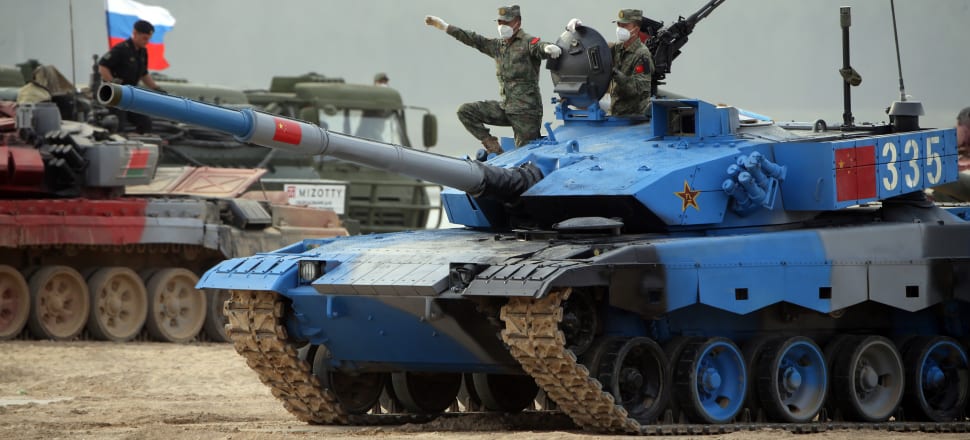
States that do not invest in military power would be wise to tool up or start doubling down on allies that do. And there will be much less room for alliance free-riders – this has obvious implications for Anzac
Opinion: Ukraine’s attack less than a fortnight ago on the Kerch Strait Bridge linking Russia to Crimea is a significant development in world politics.
It has sparked Russian retaliation, with indiscriminate missile strikes on defenceless civilians in cities across Ukraine. Fears have been raised that Moscow may use tactical nuclear weapons to reverse its loses.
As we enter a new and potentially more dangerous phase of the war, it is important to pause and consider three broader lessons that the Ukraine war holds for New Zealand.
Collectively, the lessons suggest that the world has changed in some important ways. And we need to respond accordingly.
First, since the mid-1970’s, influential advocates for the primacy of economic interdependence in world politics have contended that military power is overrated in an era of globalisation.
Ukraine is a forceful argument against this view. The US-led North Atlantic Treaty Organization (Nato) has deterred Russian nuclear escalation, even while providing significant amounts of conventional military aid to Ukraine.
This aid has been decisive in shifting the balance of power on the battlefield. Ukrainian gains since late August have led to chaotic and humiliating Russia withdrawals.
With Nato support, Ukrainian forces are retaking territory in the four regions of Donetsk, Kherson, Luhansk, and Zaporizhzhi, that Russian leader Vladimir Putin illegally declared as annexed territory in a speech on September 30.
Second, at the same time, we must not mistake quantity of military power for military quality.
In Ukraine, Russian conventional military power has not been matched by skill in deploying and organising its forces.
At the start of Putin’s self-styled ‘special military operation’ on 24 February 2022, a quick and overwhelming win appeared imminent. Successive Russian victories in Georgia (2008), Crimea (2014), and Syria (since 2015) have fed the perception that the quantity of material power is sufficient to secure victory on the battlefield.
Russia had an active force of 900,000 soldiers compared to Ukraine’s 196,000. Other metrics of military power were equally skewed.
Moreover, the Russian-Ukraine land border meant that Moscow had ‘home ground’ advantage in waging a war.
Russia’s military performance has been worse than poor. There have been multiple Russian battlefield defeats and national fury over a botched military mobilisation.
By raising serious questions about Putin’s decision-making abilities, the debacle has achieved what no NATO campaign against Russia ever could. There is now internal Russian speculation on whether Putin’s leadership is under threat.
Third, the Ukraine war has reminded us that our top trade partner China is in an era of great power competition with the US, and that Beijing is no stranger to making strategic errors.
The growing strategic competition between the US and China is reflected in the high-level US government messaging that it will not tolerate Beijing providing Russia military or other aid that is subject to US sanctions.
And errors are emerging in Chinese foreign policy. On 4 February 2022, shortly before the Ukraine war was launched, Beijing issued a joint statement after a meeting between Xi Jinping and Vladimir Putin in Beijing.
The statement declared that Beijing and Moscow “stand against the formation of closed bloc structures and opposing camps in the Asia-Pacific region and remain highly vigilant about the negative impact of the United States' Indo-Pacific strategy on peace and stability in the region.”
But the statement went further in stating that the “friendship between the two states has no limits.”
The obvious question is this — what happens when China’s “no limits” Russian friend violates the sovereignty of Ukraine, a United Nations member?
China’s Foreign Minister Wang Yi subsequently stated in a Munich Security conference speech on 19 February 2022 that Ukraine’s sovereignty must be respected. This point has been repeatedly made by China’s diplomats.
But to the extent that China has still not categorically condemned Russia’s invasion of a sovereign state, it contradicts Beijing’s advocacy for the principles of state sovereignty and non-interference in the internal affairs of other states.
The three lessons identified above suggest a basic change in the trajectory of world politics in a post-Ukraine war world. As a small trade-focused country known for punching above its weight, New Zealand needs to soberly and proactively consider its strategic position.
Doing so, some important points suggest themselves.
As 21st Century globalisation evolves, military power will be as important as economic power. States that do not invest in military power would be wise to tool up or start doubling down on allies that do. And there will be much less room for alliance free-riding. This has obvious implications for the Anzac alliance.
Putin's conduct of the Ukraine war has been an unmitigated disaster. As a state used to being a great power, Russia will now have to increasingly rely on China as a market and diplomatic counterweight to the US and its alliance partners. Moscow will chafe at having to play second fiddle to China.
And finally, the US, which is a formal alliance partner with our major trade and security partners Australia, Japan, and the UK, is now in a great power rivalry with our top trade partner China.
We will certainly want to avoid being pulled into this competition. But to what degree we can avoid collateral damage is another matter entirely.







